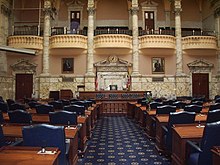Maryland House of Representatives
The Maryland House of Delegates ( Maryland House of Delegates ), the lower house of the Maryland General Assembly , the legislature of the US state of Maryland . There are only three states, Maryland, Virginia and West Virginia , that call their lower houses House of Delegates .
The Chamber of Parliament is composed of 141 MPs who are elected in 47 electoral districts. An electoral term lasts four years. Elections take place in the even years when the President of the United States is not elected. The House of Representatives boardroom, along with the State Senate, is located in the Maryland State House in the capital, Annapolis .
history
The Maryland House of Delegates was originally established as the lower house of the General Assembly in 1650 when the legislature became a bicameral system. In the following time the lower house fought repeatedly with the upper house for political influence in the colony. The House of Lords consisted of the governor and his council, all personally appointed by Lord Baltimore, and therefore served to protect his interests in Maryland. In the opposite case, the House of Commons tried to change the colony. It called for free elections for the members of the population. In this context, the House of Commons continually fought for more power. It tried to enforce exclusive rights in certain legislative areas, such as tax collection and budget approval.
The governor gained some control over the House of Commons in the late 17th century. Despite the fact that each county was entitled to four delegates , the governor elected only two of them to the House of Commons. This gave the governor control over the members of the lower house.
In 1689 Maryland succeeded by transferring its status from a protected colony to a crown colony to temporarily calm the dispute between the House of Commons on the one hand and the governor and his council on the other. Appointed by the Crown, the royal governors gave the House of Commons considerable leeway in its legislative intentions. The first royal assembly passed 85 laws in a single session in 1692. The House of Commons acted immediately and curtailed the governor's influence in the election of delegates. From then on, the elected delegates could attend the meetings without the need for a special decree from the governor. At the same time, permanent or ongoing committees were established. These eliminated the dependence on ad hoc committees and created the first modern legislature in Maryland. During this period the House of Commons was renamed the House of Delegates .
The Maryland Constitution of 1776 formally created the modern House of Delegates. Initially, representation was geographically based as voters in each county elect four delegates, two each from Annapolis and Baltimore . The delegates first completed a one-year term (from 1845 then a two-year term and from 1922 until today a four-year term).
With elections beginning in 1838, each county elected three to six delegates, depending on its population. Baltimore elected the same number of delegates as did the most populous county. After 1840 Annapolis was considered part of Anne Arundel County . Reapportionments were made after each census , in an effort to get constituencies of equal size.
The current scheme of allocation of seats in the House of Delegates began with the legislative allocation plan in 1972 and has been improved every ten years thereafter. The plan envisaged the creation of 47 legislative constituencies. Many of these crossed the county boundaries in order to achieve districts with relatively equal populations. Each of these districts sent three delegates to the House of Representatives, ultimately bringing together 141 MPs. Some of the large districts are subdivided into subdistricts to allow for certain local representation as the areas were not large enough to create a completely separate constituency.
composition
Status: legislative period, beginning January 14, 2015
| Political party | MPs | |
|---|---|---|
| Democratic Party | 91 | |
| Republican Party | 50 | |
| total | 141 | |
| position | Surname | Political party |
|---|---|---|
| Speaker | Michael E. Busch | democrat |
| Majority Leader | Anne Kaiser | Democrat |
| Opposition leader / minority leader | Nicholaus R. Kipke | republican |
Web links
- Maryland General Assembly (English)
- Project Vote Smart - Maryland House of Delegates (English)
